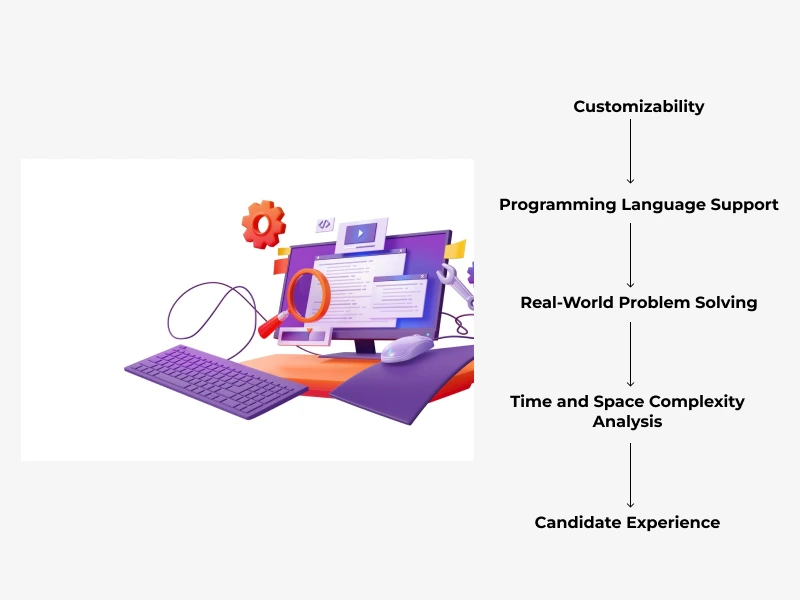Finding and hiring the appropriate personnel is getting harder in today’s competitive labor environment. Companies require dependable and effective tools to evaluate the coding abilities of potential workers given the increasing demand for competent coders. The top applicants for your organization can be found by using the appropriate coding assessment instrument. In this post, we’ll examine the numerous aspects to take into account when choosing a coding assessment tool and offer advice on how to choose wisely.
Introduction: The Importance of Choosing the Right Coding Assessment Tool
When it comes to assessing coding skills, traditional methods like interviews and resumes often fall short. These methods may not accurately reflect a candidate’s ability to solve real-world coding problems or their level of expertise in specific programming languages. This is where a coding assessment tool comes in. A good coding assessment tool can help evaluate a candidate’s technical skills, problem-solving abilities, and coding efficiency, giving you a reliable measure of their aptitude for the job.

However, with numerous coding assessment tools available in the market, it is crucial to choose one that aligns with your organization’s hiring needs and goals. Let’s delve into the key factors to consider before making a decision.
- Customizability:
One important factor to consider when choosing a coding assessment tool is its customizability. Every organization has unique requirements and preferences when it comes to assessing coding skills. The ideal tool should allow you to customize coding challenges and assessments based on your specific needs. This way, you can create assessments that accurately reflect the skills required for the job position you are hiring for.
- Programming Language Support:
Another crucial factor to consider is the programming language support provided by the coding assessment tool. Depending on your organization’s tech stack and the positions you are hiring for, you may require assessments that focus on specific programming languages such as Python, Java, or JavaScript. Ensure that the tool you choose offers a wide range of programming languages to cater to your hiring needs.
- Real-World Problem Solving:
A coding assessment tool should go beyond testing a candidate’s knowledge of syntax and basic coding concepts. It should provide real-world problem-solving scenarios that simulate the challenges developers face in their day-to-day work. Look for a tool that offers coding challenges that require candidates to think critically, analyze problems, and come up with efficient solutions.
- Time and Space Complexity Analysis:
Coding requires efficiency, especially in a professional environment. Insights into an applicant’s ability to produce temporally and spatially complex code should be available through an appropriate code assessment tool. Look for a tool that can evaluate the effectiveness of candidate code and provide in-depth information about its performance.
- Candidate Experience:
Finally, when selecting a coding assessment instrument, take the candidate experience into account. Candidates will have a favorable opinion of a tool if it has a user-friendly interface, clear instructions, and an easy testing process. This can help improve the hiring process in general and draw top talent to your business.
You can speed your hiring process, find top coding talent, and make sure your company has the technical know-how it needs to flourish by taking into account these variables and selecting the best code evaluation tool.
Understanding the Key Factors to Consider in a Coding Assessment Tool
Using a code evaluation tool can alter the game for businesses when it comes to assessing a candidate’s coding abilities. But not all instruments are made equally. There are a few essential factors to keep in mind while trying to make the best decision:

- Accuracy and Validity: A coding assessment tool’s main goal is to fairly assess a candidate’s coding abilities. Look for tools that have undergone thorough statistical analysis validation and deliver trustworthy and consistent findings. Tools with poor design may result in erroneous evaluations and possible hiring errors. Selecting a tool with a track record of accuracy is essential.
- Test Customization: Each company may have specific requirements and coding standards. A coding assessment tool should allow for customization, enabling you to create tests that align with your organization’s needs. Look for tools that provide flexibility in selecting coding languages, difficulty levels, and specific coding challenges. This customization is essential to ensure that the assessment accurately reflects the skills required for the job.
- Candidate Experience: The ease of use and intuitiveness of the coding assessment tool can significantly impact the candidate’s experience. A user-friendly interface and clear instructions can help candidates focus on their coding skills rather than grappling with the tool’s complexities. Look for tools with intuitive interfaces and features like code autocompletion to enhance the candidate experience. A positive experience can leave a lasting impression on candidates and contribute to a favorable employer brand.
- Collaboration and Proctoring: If your hiring process involves remote assessments, consider a coding assessment tool that enables collaboration between team members or provides proctoring features to ensure integrity. Collaboration features allow multiple team members to assess the candidates’ coding solutions, providing a holistic evaluation of their skills. Proctoring features, on the other hand, can help prevent cheating and maintain the integrity of the assessment process.
- Scalability and Integration: As your organization grows, so does your hiring pipeline. Choose a coding assessment tool that scales with your needs, supporting a large number of candidates without sacrificing performance. Integration with your existing applicant tracking system or learning management system can streamline the hiring workflow and enhance efficiency. Look for tools that offer seamless integration options to avoid any disruptions in your hiring process.
You can choose a code assessment tool with confidence and in alignment with the requirements of your organization by taking into account these important elements. Always keep in mind that the correct tool may greatly enhance your hiring procedure and guarantee that you locate the top programmers for your company.
Types of Coding Assessment Tools: Pros and Cons
There are many different types of coding assessment tools available, each with merits and drawbacks. Let’s examine a few prevalent types:

1.Automated Coding Challenges: These tools provide pre-set coding challenges that candidates need to solve within a given timeframe.
Automated coding challenges have gained popularity in the recruitment process due to their time efficiency and objective assessment. By providing pre-set coding challenges, these tools allow recruiters to evaluate candidates’ coding skills quickly and efficiently. The time limit adds a sense of urgency and mimics real-world scenarios where developers often work under tight deadlines. Additionally, automated coding challenges offer scalability, making it possible to assess a large number of candidates simultaneously.
However, it’s important to note that automated coding challenges have their limitations. While they provide an objective assessment, they may not fully simulate real-world coding scenarios. Candidates may excel in solving pre-set challenges but struggle when faced with complex and unique problems. Furthermore, these tools have limited customization options, which may restrict the evaluation of specific skills or technologies that are relevant to your organization.
2. Live Coding Interviews: These tools facilitate real-time coding assessments where a candidate collaborates with an interviewer to solve coding problems.
Live coding interviews aim to recreate the actual coding environment and provide a platform for candidates to demonstrate their problem-solving skills in real-time. By interacting with an interviewer, candidates can receive immediate feedback, clarifications, and guidance during the assessment process. This interactive nature of live coding interviews allows recruiters to assess a candidate’s ability to think on their feet, communicate effectively, and collaborate with others.
However, it’s important to consider the potential drawbacks of live coding interviews. Conducting live coding interviews can be time-consuming, especially when scheduling and coordinating availability between the interviewer and the candidate. Additionally, the synchronous nature of these interviews may introduce interview bias, as candidates who perform well under pressure may have an advantage over those who prefer a more reflective and deliberate coding process.
3.Interactive Programming Assessments: These tools offer interactive coding environments where candidates can write, run, and test code.
Interactive programming assessments provide candidates with a hands-on coding experience, allowing them to write, run, and test their code in real-time. These tools often come with a user-friendly interface that closely resembles popular integrated development environments (IDEs), making candidates feel comfortable and familiar during the assessment. The flexibility and customization options offered by interactive programming assessments make it possible to evaluate candidates’ skills in specific programming languages or frameworks relevant to your organization.
However, it’s important to consider the limitations of interactive programming assessments. Candidates need access to a stable internet connection to use these tools effectively. Additionally, some interactive programming assessment platforms may have limited support for complex programming languages or specific frameworks, which may not fully cater to the technical requirements of your organization.
Understanding the advantages and disadvantages of each type will help you choose the code evaluation tool that best suits your organization’s needs and your employment.
Analytics and Reporting: Gathering Insights from Assessment Results
Choosing a coding assessment tool that provides robust analytics and reporting capabilities can offer valuable insights into candidate performance and help make data-driven hiring decisions. Look for tools that generate detailed reports, showcasing individual candidates’ strengths and weaknesses, performance in specific coding areas, and comparative analysis.

Analytics and reporting features can also facilitate benchmarking, allowing you to compare candidate results against industry standards or internal metrics. These insights can guide your decision-making process and help identify top candidates who possess the coding skills required for your organization’s success.
Making the Final Decision: Selecting the Right Coding Assessment Tool for Your Organization
Now that you are aware of the key factors to consider and the various types of coding assessment tools available, it’s time to make the final decision. Evaluate your organization’s specific needs, budget constraints, and hiring goals. Seek feedback from your technical team, HR department, and recruiters to ensure the tool meets their requirements.
Consider conducting a trial period with the shortlisted coding assessment tools, involving a diverse group of candidates to gather first-hand feedback on usability and effectiveness. Ultimately, selecting the right coding assessment tool requires finding a balance between accuracy, customization, candidate experience, and scalability.
By investing time and effort in choosing the right coding assessment tool for your hiring needs, you can streamline your hiring process, attract top talent, and build a high-performing team of skilled coders who will drive your organization’s success in the ever-evolving tech industry.










